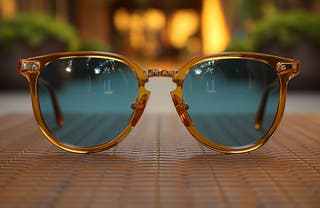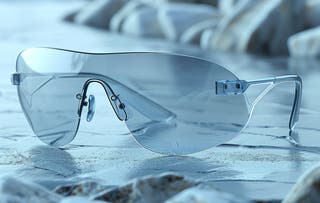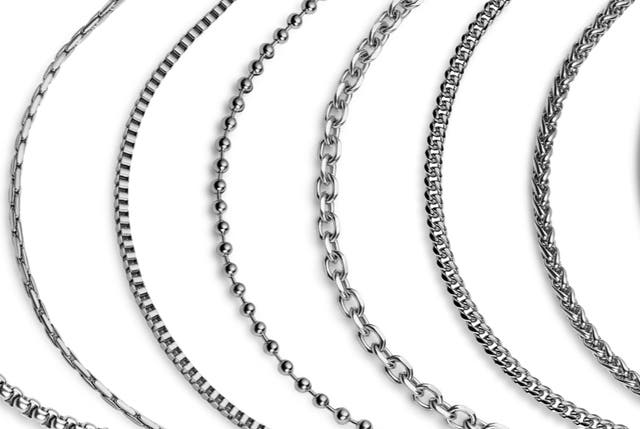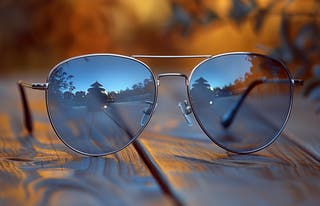5 TYPES | FIND THE RIGHT SUNGLASSES LENS MATERIAL FOR YOU
Lens material affects the weight, durability, clarity, and protection level of your sunglasses. Whether you're a style-savvy skater or an outdoor enthusiast, understanding the differences between lens materials like glass, TAC (Tri Acetate Cellulose), and PC (Polycarbonate) can save you from disappointment with your new shades. Read on and choose wisely.

1. Glass Lenses
.jpg?format=pjpg&auto=webp&quality=75%2C90&width=320)
- Superior optical clarity
- The best scratch resistance
.jpg?format=pjpg&auto=webp&quality=75%2C90&width=320)
- Heavy
- May shatter upon impact
Glass lenses are the OGs of sunglasses. They offer the crispest vision of any lens material and are highly resistant to scratches, making them perfect for everyday use. Glass lenses are heavier than their plastic counterparts and can shatter upon impact, so they’re not exactly ideal for high-impact sports or activities where durability is key.
2. Tri Acetate Cellulose (TAC) Lenses
.jpg?format=pjpg&auto=webp&quality=75%2C90&width=320)
- Lightweight
- Excellent polarization capabilities
.jpg?format=pjpg&auto=webp&quality=75%2C90&width=320)
- Less scratch-resistant than glass
- Reduced optical quality
TAC lenses are incredibly lightweight, making them comfortable for all-day wear. They’re also known for their excellent polarizing capabilities, which means they're great at reducing glare from reflective surfaces like water or snow. While they provide good optical clarity and are more impact-resistant than glass, they're not as scratch-resistant, so a little extra care is needed.
*Please note that not all TAC lenses are polarized. The ones below are.
EXPLORE TAC SUNGLASSES
3. Polycarbonate (PC) Lenses
.jpg?format=pjpg&auto=webp&quality=75%2C90&width=320)
- Highly impact-resistant
- Lightweight
.jpg?format=pjpg&auto=webp&quality=75%2C90&width=320)
- Less scratch-resistant
- Reduced optical clarity compared to glass
Polycarbonate lenses are lightweight, impact-resistant, and offer excellent UV protection. They’re a top choice for sports sunglasses, children's eyewear, and safety glasses. PC lenses are also up to 10 times more impact-resistant than plastic or glass lenses, making them virtually shatterproof. But they’re more prone to scratching, so we recommend scratch-resistant coating options if you intend to be rough with them.
EXPLORE PC SUNGLASSES
4. CR-39 Lenses

.jpg?format=pjpg&auto=webp&quality=75%2C90&width=320)
- Better optical clarity than polycarbonate
- Lightweight
- Good scratch resistance
.jpg?format=pjpg&auto=webp&quality=75%2C90&width=320)
- Less impact-resistant than polycarbonate
- Bulky in prescription glasses
CR-39, a plastic polymer, strikes a balance between glass and polycarbonate lenses. It offers better optical clarity than polycarbonate, weighs less, and is more impact resistant than glass. They have excellent scratch resistance, though not quite as good as glass, so they’re a good option for those who want high-quality vision and durability without the weight of glass lenses.
5. Trivex Lenses

.jpg?format=pjpg&auto=webp&quality=75%2C90&width=320)
- Superior impact resistance
- Lightweight
- Better optical clarity than polycarbonate
.jpg?format=pjpg&auto=webp&quality=75%2C90&width=320)
- The most expensive of the plastics
Trivex lenses offer a similar profile to polycarbonate lenses – lightweight, strong, and with full UV protection – but with better optical clarity. They’re also more resistant to chemicals, and their light weight and strength make them a great option for those with high prescriptions.
Choosing the Right Material
If optical clarity is your top concern, nothing beats glass. For an active lifestyle, polycarbonate or Trivex lenses offer durability and protection. TAC lenses are great for reducing glare without breaking the bank, while CR-39 provides a happy medium for everyday use.
The main question you have to ask yourself is: “Do I need to block glare?” Quality non-polarized PC lenses and polarized TAC lenses are about the same price, and if you drive a lot or fish, go for polarized TAC. But if you’re looking for all-round sunglasses for everyday use around town, PC lenses will give you greater clarity.
Understanding these materials' nuances empowers you to pick the perfect pair for your style, comfort, and protection. Next time you're browsing for sunglasses, remember it's not just about how they frame your face; it's also about how they color your life.
EXPLORE OUR BEST-SELLING SUNGLASSES
YOU ASKED – WE ANSWERED
Yes, for most applications. Polycarbonate lenses are lighter, significantly more impact-resistant, and offer UV protection, making them ideal for sports and safety glasses.
Not necessarily. Lens material alone doesn't guarantee UV protection. Look for lenses specifically labelled as offering 100% UVA and UVB protection.
Polarization is a lens treatment and can be applied to most lens materials, including glass, polycarbonate, and others. However, availability may vary by brand and model.
Use a microfiber cloth and lens cleaning solution. Avoid using paper towels, clothes, or household cleaners that can damage the lens coatings.
Beyond their stylish appearance, mirrored lenses reduce glare by reflecting sunlight away from your eyes, making them beneficial in very bright conditions.
Read more about lens coatings here.
OTHER RELEVANT ARTICLES

What to Wear to a Music Festival – Summer Festival Style Guide
When it comes to festivals, it’s about accessories (and fun). We’ve put together our top tips to get you there in style.

Sunglasses – Protect Your Eyes from the Sun
Everything you need to know about protecting your eyes from harmful UV rays and blinding glare. And how to choose the right pair of sunglasses for you.

The Meaning of UV Protection on Sunglasses
Make sense of the different UV tags.

Trending Men’s Sunglasses Styles This Year
Based on our sales and research, these are this year's hottest trends in sunglasses for men.

What Men's Sunglasses Fit My Face Shape?
Men's sunglasses according to face shape: square, rectangular, A-tirangle, V-triangle, heart, diamond, oval, round, or oblong.

The 9 Most Popular Necklace Chain Types & Chain Links for Men
Find the perfect chain type with our comprehensive guide to the 9 most popular necklace chain links for men. From silver Figaro to steel anchor chains.



